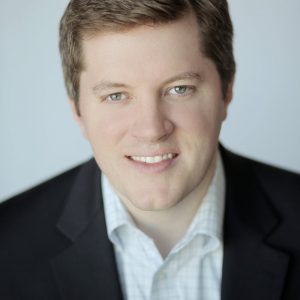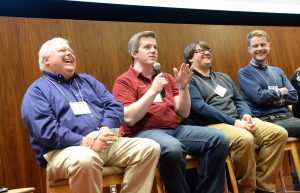Lusk, the 2019 Student Media Board banquet speaker, helps Fortune 100 brands assess and improve their advertising strategies and reach.
by Julia Oakes ’22 and Colin Donohue ’05
From the age of 16, when he landed his first gig working for a radio station, Travis Lusk ’05 was certain that he would end up working in the media industry. So when he came to Elon in 2001, he began his pursuit of a communications degree, with a dual concentration in broadcast and corporate communications. He quickly jumped into student media, specifically WSOE 89.3 FM, where he would eventually serve as a station manager.

Lusk, currently an independent media consultant, credits his student media experiences for preparing him professionally and helping him navigate the career path he’s taken.
“It became more and more apparent after realizing that very few of my professional peers had the same path and opportunity as me due to the fact that I was able to do so much in student media while in school,” said Lusk, who will speak May 14 at the Student Media Board banquet. “I don’t know that I’ve ever had a colleague – other than Elon alums – that had even close to the same experience as I did. I think I always had a slight advantage as a result.”
Based in New York, Lusk’s previously worked as the vice president of brand solutions at Integral Ad Science, where he helped Fortune 100 brands understand what media buys make a maximum impact on their sales. He works with clients such as Coke, JetBlue, Chrysler, Danone, Nissan, Novartis and more.
But his journey began with radio, where he started as a DJ before leaping to the top spot of WSOE. He valued the opportunity to experiment, to fail, to learn and then to try again – all from the comfort of a corner office in Moseley.
“There weren’t many faculty, let alone students, that had private corner offices with a view,” Lusk said. “But there we were, with our own professional setup, left more or less alone to execute whatever crazy idea we could come up with. I was proud of the work we did. The only thing standing between you and the content you wanted to create was your willingness to put in the work.”
He parlayed his experience at WSOE into an internship with CBS Radio in New York, where he made a good enough impression that the organization hired him after he graduated. He worked as CBS Radio’s market digital media manager for almost five years before he transitioned into the ad buying evaluation work he does now.
In addition to WSOE, Lusk also worked for The Pendulum, almost by accident, when his friends Jessica Patchett ’05 and current Elon Director of Student Media and Instructor in Communications Colin Donohue ’05 recognized his graphic design and photography skills and asked him to come aboard.

Fortunately for Lusk, the two offices were located across the hall from one another in upstairs Moseley, saving him travel time. It was in those spaces, tucked away in Moseley, where Lusk learned a great deal about managing a staff and running an organization.
“Leadership is the skill that has been put to use in every professional career I’ve had,” Lusk said. “Leading an organization of more than 100 members when you are 20 years old is a trial by fire. The good news is that you get to screw up a lot with minimal consequences. As a result, more of those screw-ups are out of your system before you enter the professional workforce.”
One of Lusk’s main priorities as general manager of WSOE was to conceive strategies to sustain the organization. That meant increasing budget, developing new ideas and bringing in new members.
“The thing that I thought I could do that would be most effective would be to continually grow the station budget and increase membership,” he said. “Basically, get more students involved.”
Lusk and his team took advantage of their location in Moseley, or “the hub for prospective and new student orientation,” as he labeled it, and devised the idea to begin recruiting incoming first-year students, in hopes they would be the “legs” holding up the organization.
“I knew that getting kids interested in WSOE early was the key to increasing membership,” Lusk said. “I knew that if I had a crack at them before the rest of the organizations, we would stand a better chance at getting them to sign up.”
Lusk and his staff began to mastermind recruitment methods that weren’t exactly endorsed by the university. And so, on heavy campus tour days, WSOE staff members wore their organization shirts and lured in groups that were finishing up their campus tours – with the help of their fancy equipment – for an additional tour of the station.
Complementing his recruitment strategies, Lusk said he also often found himself “pestering” advisers and the Student Government Association to increase the station budget for various expenditures, including new equipment for the studio.
“I was pretty relentless but ended up getting the funding we wanted more often than not,” he said.
Lusk has fond memories of his time in student media, and he advised students to take advantage of their opportunity to gain professional experience. It will make them stand out among their peers when they apply for internships and jobs.
“The time involved in student media is what you make of it,” Lusk said. “It is yours to make and yours to lose. I can tell you this, even though I was very, very involved, in hindsight I would have done more. You don’t realize it in the moment, but you don’t get the time back later on.
“It is also the single best way to build a portfolio of highly demonstrable work that will absolutely be the thing that gets you the first job out of school. Every student graduating from every communications/journalism school in America looks exactly the same on paper. The ones who stand out are the ones who have proof of their skills.”


